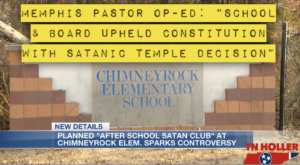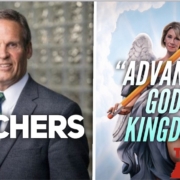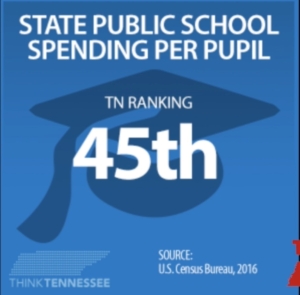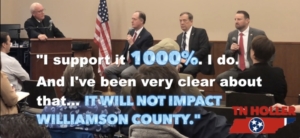Memphis Pastor: “School & Board Upheld Constitution With Satanic Temple Decision”

“This moment offers us, yet again, an opportunity to believe the gospel of the God who does not coerce or control, but can work grace into the world even through The Satanic Temple.”
When I stepped up to preach last Sunday, I never imagined that by the end of the week I would be penning an Op-Ed in defense of The Satanic Temple. But here we are.
Despite the objection of petitioning pastors, Chimney Rock Elementary and the local school board did the right thing by providing space for The Satanic Temple. They refused to infringe upon First Amendment rights. They refused to apply religious freedom inconsistently by allowing Christians special privileges they would not allow other groups.
Instead of criticizing and protesting their decision, Christians should applaud it.
Yes, we can disagree with The Satanic Temple’s atheism (they are, in fact, atheists not satanists). We can even feel revulsion at their choice of name. But what we cannot do, what we should not do, is force the school to act upon our religious beliefs. To do so would confirm for The Satanic Temple that Christians are, in fact, the fascists they think we are.
Schools give churches maximal latitude, inviting us to help fundraise, provide for underprivileged students, and even conduct after school Bible studies. This permeation of the wall of separation between church and state is a privilege they offer us not a right we can demand. To deny that privilege to others because we do not like their organization’s name is not only to deny them something that is not ours to deny, but it is also to resist the application of their constitutional rights. The American courts have affirmed this repeatedly.
But the courts should never have had to decide it. American Christians should excitedly support it. Early American Protestants argued for a Principled Pluralism, which affirmed the God-given rights of people to disagree with my religion and still participate in the American experiment. They determined that for this country to be a functional democracy, pluralism must be valued on principle. More than just good nation-building, Principled Pluralism flowed from Protestant theology: the Christian God is not interested in coercion or control. The Christian God honors free will and the freedom of conscience. The Christian gospel can stand on its own without legal force behind it. Authoritarianism undercuts the Christian message that God died on a cross rather than taking Satan’s temptation to control the kingdoms of the world.
In a state where voucher programs are threatening to cut the funds flowing to public schools in order to support private schools for the wealthy, the truly true evil at work in our educational system is not atheists trying to help our kids think rationally. With The Satanic Temple, the church might find a worthy partner in resisting the commodification of education, the exploitation of teacher labor, and the funneling of taxpayer funds to private schools. Indeed, we might find in The Satanic Temple, an ally in the education of our most vulnerable students. And in that they might be the unwitting agents of God’s grace in the life of a child.
When I prayed before my congregation on Sunday, I never imagined that by the end of the week I would be writing an Op-Ed defending The Satanic Temple. But here we are. Fortunately, we do not have to stay where we are. This moment offers us, yet again, an opportunity to believe the gospel of the God who does not coerce or control, but can work grace into the world even through The Satanic Temple.
Tom Fuerst is the lead pastor of Memphis First UMC. He received his B.A. in Biblical Studies from Hannibal LaGrange University (2003), a M.A. in Religious Studies at the University of Missouri (2006), a M.Div. from Asbury Theological Seminary (2010), and a PhD. in Rhetoric from the University of Memphis (2022)





